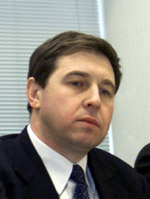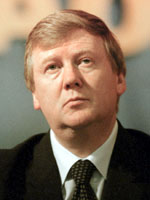 Presidential
adviser Andrei Illarionov Presidential
adviser Andrei Illarionov
Leaders of parliament on Monday
refused to set a date to debate laws
on a controversial electricity sector
overhaul, raising concerns that the
Kremlin's resolve to reform the lumbering
power monopoly has crumbled.
"A decision was taken not to consider
this at the remaining two Duma
sessions," Gennady Seleznyov, speaker of the
State Duma, told reporters when
asked about the decision by the chamber's
agenda-setting body, the Duma
Council.
"One of the meetings of the Duma
Council in January will set the date
when the issue will be discussed."
The government's plan to smash
electricity monopoly Unified Energy
Systems and free power prices to attract
investment in its crumbling
infrastructure appears caught in the
crossfire of competing political
groups.
Sergei Ivanenko, a senior member of
the liberal Yabloko faction, which
opposes the reform plan, said the council
had rejected a proposal to set a
reading date for Jan. 22.
"The fight over this packet of bills
is not between Duma factions, it
is within the executive branch," Ivanenko
said.
Renaissance Capital utility analyst
Hartmut Jacob held out slim hopes
that the bills could pass quickly when
parliament reconvenes after the
holidays.
Itar-Tass
UES chief Anatoly Chubais
"There is still a small chance they might set a date after they
meet in January. But that chance is  getting
smaller and smaller every day," Jacob said. getting
smaller and smaller every day," Jacob said.
Parliament and Kremlin alike appear
riven by doubts whether the reform
should go forward.
President Vladimir Putin in a
televised address last week praised
legislators' cautious approach to the reform
and paid lip service to the
main principles of the project, promising
steady progress on reform of
public services.
That was just two days after his chief
of staff, Alexander Voloshin,
who also serves as head of the UES board of
directors, said the main concern
was quality of reforms, not time frames. The
remark was seen as official
Kremlin approval for delays.
Analysts have said that a failure by
the Duma to set a date for the
crucial second reading for January or
February would probably mean putting
off reforms for two years as the Duma will
be caught up in an election
cycle.
Parliamentary elections are set for
December 2003 and any reform
involving price increases for consumers
would be unpopular among voters.
Some centrist factions are lobbying for
strict price caps for households.
"There will be no heating in the country,
people will freeze, everything
will be stolen," Boris Nemtsov, leader of
the liberal Union of Right Forces
party, said Sunday.
"Even a super popular leadership can
become outcasts, because they
would have to answer why people have to heat
themselves around the stove."
UES chief Anatoly Chubais has also
poured fuel on raging rumors that
influence peddling is behind the multiple
delays in the second reading. He
said an unknown but politically influential
mystery buyer, who is building
up a stake in UES, had engineered the delays
to depress share prices.
However, Andrei Illarionov, Putin's
economic adviser, hinted Sunday
that Chubais might himself be linked to the
mystery buyer, the Financial
Times reported.
"[Chubais] certainly gives the impression of being very well
informed" about the individuals apparently purchasing large blocks
of UES shares at cut prices in an effort to delay or profit from
uncertainties around the reform process," the FT quoted Illarionov
as saying.
The comments were vigorously denied by
UES.
UES shares slid more than 3 percent to
close at 12.7 cents Monday.
"I don't think they'll bury [the
bills] too deep," Brunswick UBS
Warburg utility analyst Fyodor Tregubenko
said. "The new shareholders
obviously ... are strategic, not portfolio
investors. Apparently they have
simply not received an answer to the
question of how they will receive
assets [in the reform]," he said.
(Reuters, MT)
See also:
the origianl at
www.themoscowtimes.com
Energy Sector Reform |